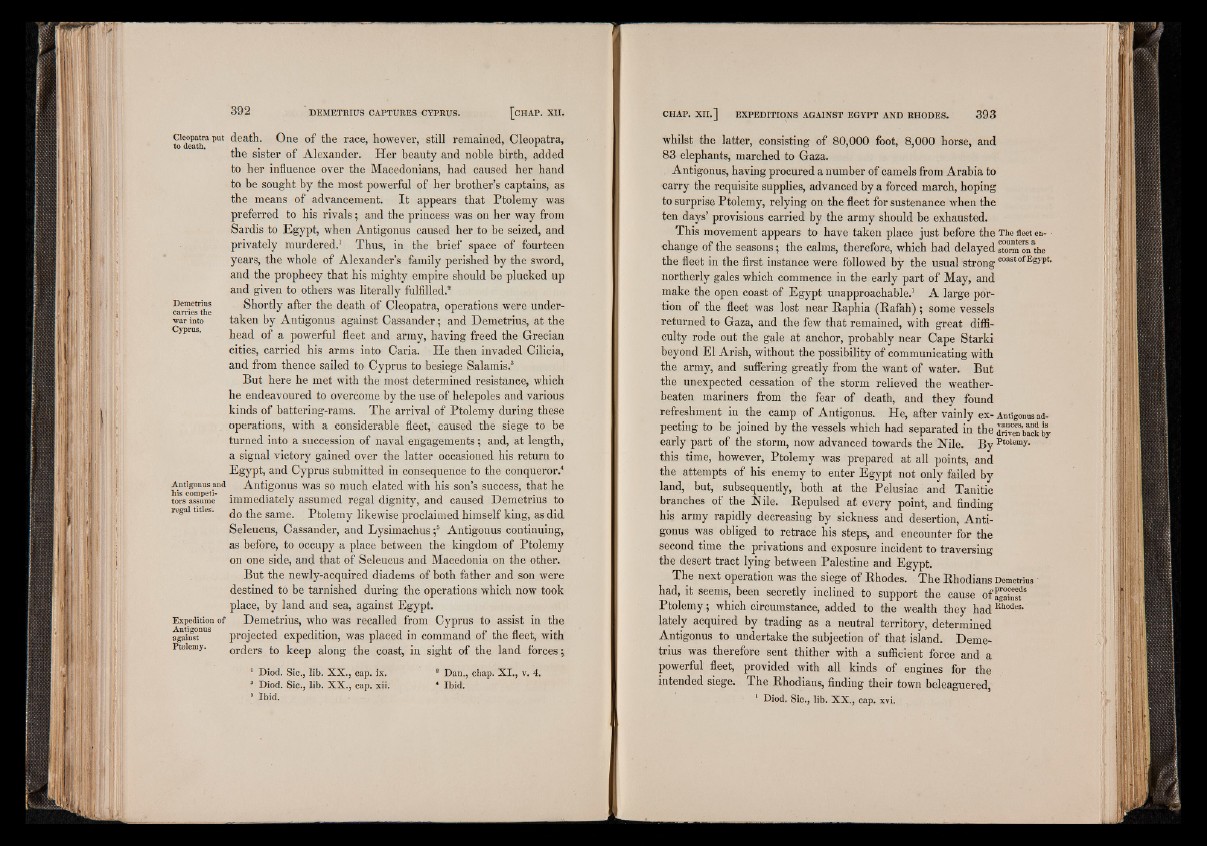
Cleopatra put
to death.
Demetrius
carries the
war into
Cyprus.
Antigonus and
his competitors
assume
regal titles.
Expedition of
Antigonus
against
Ptolemy.
death. One of the race, however, still remained, Cleopatra,
the sister of Alexander. Her beauty and noble birth, added
to her influence over the Macedonians, had caused her hand
to be sought by the most powerful of her brother’s captains, as
the means of advancement. It appears that Ptolemy was
preferred to his rivals; and the princess was on her way from
Sardis to Egypt, when Antigonus caused her to be seized, and
privately murdered.1 Thus, in the brief space of fourteen
years, the whole of Alexander’s family perished by the sword,
and the prophecy that his mighty empire should be plucked up
and given to others was literally fulfilled.2
Shortly after the death of Cleopatra, operations were undertaken
by Antigonus against Cassander; and Demetrius, at the
head of a powerful fleet and army, having freed the Grecian
cities, carried his arms into Caria. He then invaded Cilicia,
and from thence sailed to Cyprus to besiege Salamis.3
But here he met with the most determined resistance, which
he endeavoured to overcome by the use of helepoles and various
kinds of battering-rams. The arrival of Ptolemy during these
operations, with a considerable fleet, caused the siege to be
turned into a succession of naval engagements; and, at length,
a signal victory gained over the latter occasioned his return to
Egypt, and Cyprus submitted in consequence to the conqueror.4
Antigonus was so much elated with his son’s success, that he
immediately assumed regal dignity, and caused Demetrius to
do the same. Ptolemy likewise proclaimed himself king, as did
Seleucus, Cassander, and Lysimachus ;5 Antigonus continuing,
as before, to occupy a place between the kingdom of Ptolemy
on one side, and that of Seleucus and Macedonia on the other.
But the newly-acquired diadems of both father and son were
destined to be tarnished during the operations which now took
place, by land and sea, against Egypt.
Demetrius, who was recalled from Cyprus to assist in the
projected expedition, was placed in command of the fleet, with
orders to keep along the coast, in sight of the land forces;.
1 Diod. Sic., lib. X X ., cap. ix.
3 Diod. Sic., lib. X X ., cap. xii.
5 Ibid.
Dan., chap. X I ., v. 4.
Ibid.
whilst the latter, consisting of 80,000 foot, 8,000 horse, and
83 elephants, marched to Gaza.
Antigonus, having procured a number of camels from Arabia to
carry the requisite supplies, advanced by a forced march, hoping
to surprise Ptolemy, relying on the fleet for sustenance when the
ten days’ provisions carried by the army should be exhausted.
This movement appears to have taken place just before the The fleet en- ■
change of the seasons; the calms, therefore, which had delayed imir.
the fleet in the first instance were followed by the usual strong coastofEgJ,pt'
northerly gales which commence in the early part of May, and
make the open coast of Egypt unapproachable.1 A large portion
of the fleet was lost near Eaphia (Rafah); some vessels
returned to Gaza, and the few that remained, with great difficulty
rode out the gale at anchor, probably near Cape Starki
beyond El Arish, without the possibility of communicating with
the army, and suffering greatly from the want of water. But
the unexpected cessation of the storm relieved the weatherbeaten
mariners from the fear of death, and they found
refreshment in the camp of Antigonus. He, after vainly ex-Antigonus ad-
pecting to be joined by the vessels which had separated in theSvenbtckby
early part of the storm, now advanced towards the Nile. By Ptolem>'-
this time, however, Ptolemy was prepared at all points, and
the attempts of his enemy to enter Egypt not only failed by
land, but, subsequently, both at the Pelusiac and Tanitic
branches of the Nile. Repulsed at every point, and finding
his army rapidly decreasing by sickness and desertion, Antigonus
was obliged to retrace his steps, and encounter for the
second time the privations and exposure incident to traversing
the desert tract lying between Palestine and Egypt.
The next operation was the siege of Rhodes. The Rhodians Demetrius •
had, it seems, been secretly inclined to support the cause ofa^S*8
Ptolemy; which circumstance, added to the wealth they hadEhodes-
lately acquired by trading as a neutral territory, determined
Antigonus to undertake the subjection of that island. Demetrius
was therefore sent thither with a sufficient force and a
powerful fleet, provided with all kinds of engines for the
intended siege. The Rhodians, finding their town beleaguered,
1 Diod. Sic., lib. X X ., cap. xvi.